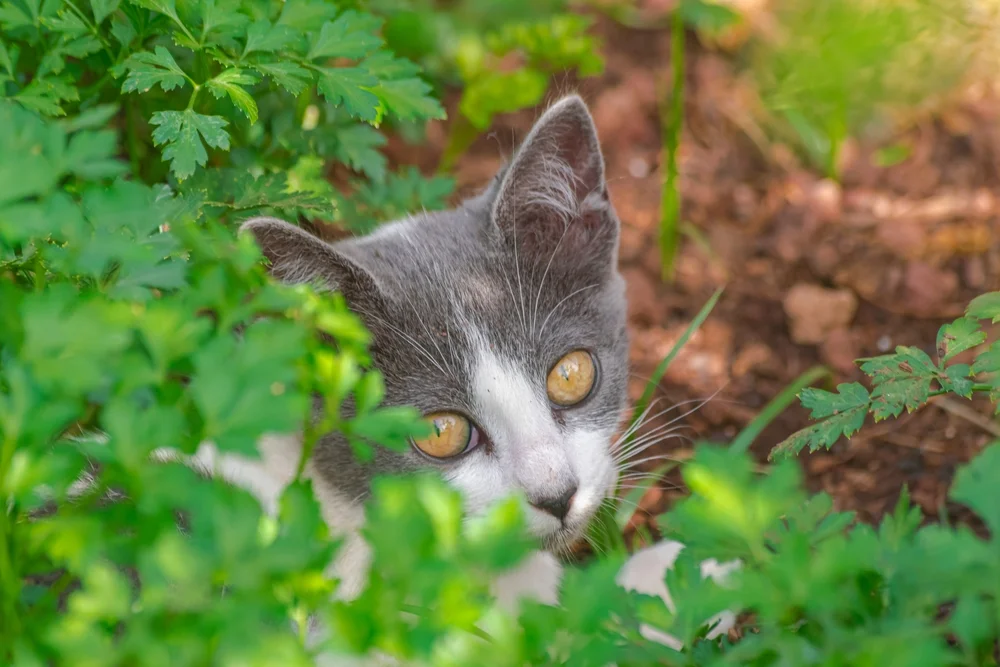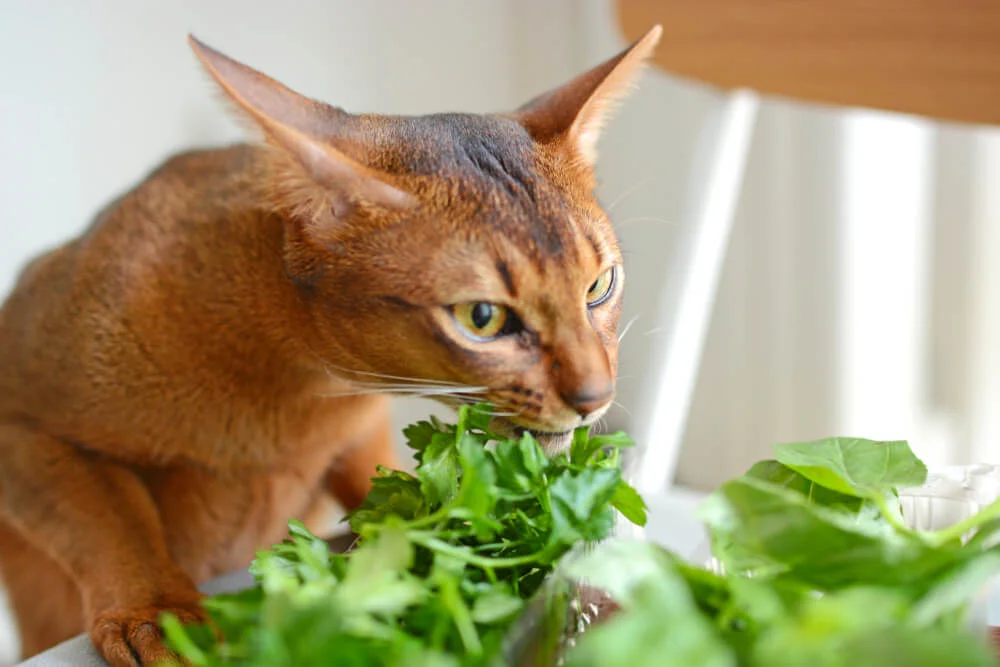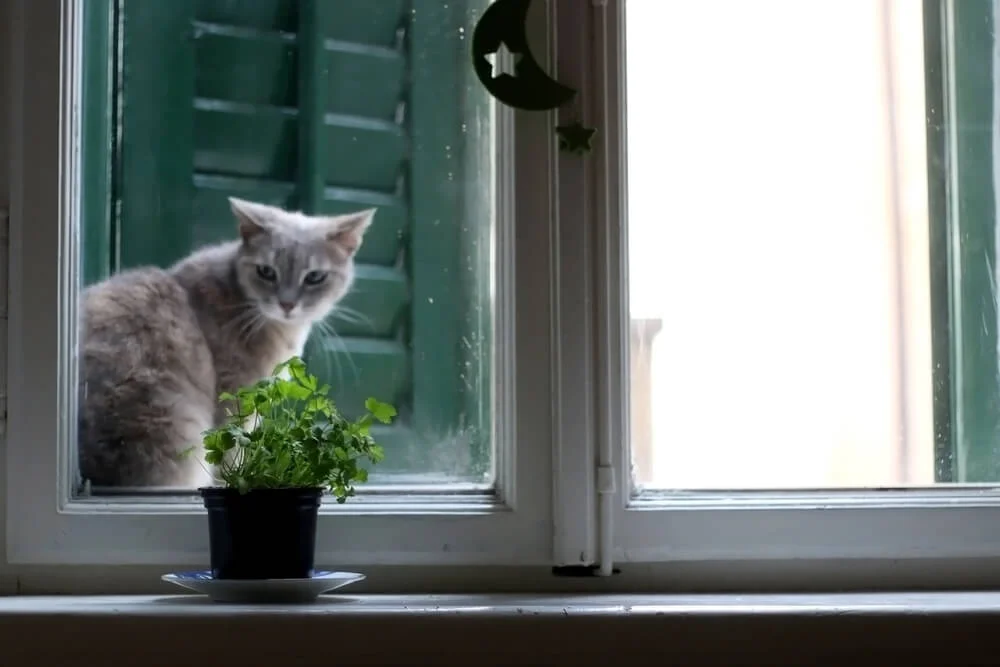
As pet parents, we strive to give our furry friends the very best, especially when it comes to what they eat. Cats are obligate carnivores, which means their diet must be predominantly animal protein. If they don’t eat this way, they can quickly become seriously unwell. This is why your cat could never become a vegetarian. However, cats are curious creatures, and some do enjoy munching on greenery from time to time.
Is Parsley Safe For Cats?
The answer to this question is not clear-cut, and the simple truth is there are no validating scientific studies to allow for a definitive conclusion on whether parsley is safe for your feline person. However, importantly, the ASPCA lists Parsley as toxic to cats, dogs, and horses. This is because there are some significant risks that are associated with your cat consuming large amounts of parsley, which are discussed below. Across the internet, there are several reported benefits to feeding parsley in smaller quantities. To reiterate, there is no current scientific evidence to support these benefits, but we will explore the claims below.
Reported Benefits of Parsley
Diuretic
A diuretic is a substance that leads to the body producing more urine. Parsley has long been reported as a diuretic in folk medicine. There has been little academic investigation in human or veterinary medicine, but a study published in 2002 found that parsley has a diuretic effect in rats. There is also a study that has found parsley is beneficial in the reduction of bladder stone formation, again in rats. Neither of these findings has been validated in cats, but this work has been assumed transferrable in the pet care community. This has meant that parsley is often recommended in pet blogs as a home remedy to help cats with urinary tract issues. Caution should be taken with this approach, as urinary tract issues with cats can often be complex and multifactorial. Attempting at-home treatment without veterinary guidance is inadvisable due to the risk of your cat developing life-threatening complications by delaying appropriate investigations and treatment.
Vitamins and Minerals
In its own right, parsley is rich in vitamins, such as vitamin C and D, and minerals, such as calcium, making it a great addition to our diets as humans. When it comes to dietary vitamins and minerals, you can get too much of a good thing, and toxicities are possible. This is why it’s very important that your cat is eating recipes that meet AAFCO’s standards for a complete & balanced diet. Therefore, if you are unsure if your cat’s diet needs a boost, chat with your veterinarian.
Risks of Feeding Your Cat Parsley

The main toxicity concern with parsley is photosensitization, which happens when the skin becomes more sensitive to sunlight and will more readily become sun-damaged.
These effects are reported to be more severe in curly leafed or spring parsley. Neither of these parsley types should be fed to your cat. Large amounts of flat-leafed parsley may also result in photosensitization.
Photosensitisation
The main toxicity concern with parsley is photosensitization. Photosensitisation is when the skin becomes more sensitive to sunlight and will more readily become sun-damaged. It can happen with a number of things, such as the ingestion of certain plants, including parsley. It can be very painful and, in extreme cases, can lead to loss of extremities such as ear tips.
Contact Dermatitis
Contact dermatitis is a form of skin allergy after touching an irritant. This has been reported in animals after contacting spring parsley.
What Can I Give My Cat Instead Of Parsley?
Given that we can’t be sure of the health benefits of parsley and there are known risks to its consumption, it may be safer to consider diverting your cat to an alternative form of greenery to chew on when they get the urge. Consider planting some catnip or cat grass in your garden. These are both safe alternatives.
What About Dried Parsley?
Given that dried herbs tend to be more potent, it stands to reason that a smaller amount could induce toxicity in your cat than a similar weight of fresh parsley. Therefore, despite no studies to confirm, it is not advisable to feed dried parsley.
What About Parsley Sauce?
Parsley sauce should not be fed to cats. As discussed, we can’t be certain parsley is harmful to cats in small quantities, but we do know that many adult cats are lactose intolerant. Parsley sauce contains both milk and butter (not to mention a lot of calories!), and it is very likely to give your cat a tummy upset.
Conclusion

If you are currently exploring making your cat a home-prepared diet, I strongly advise you do this under the guidance of a licensed veterinary nutritionist who can tailor a diet to your cat’s specific needs. If your cat has a medical condition and you are looking to supplement their diet, ensure you do so under the guidance of your cat’s veterinarian to ensure there are no conflicting actions between drugs and supplements. A high-quality, complete & balanced cat food, alongside readily available freshwater, will contain all the nutrients your cat needs. Your veterinarian will advise you if your cat’s medical needs require additional supplementation.



